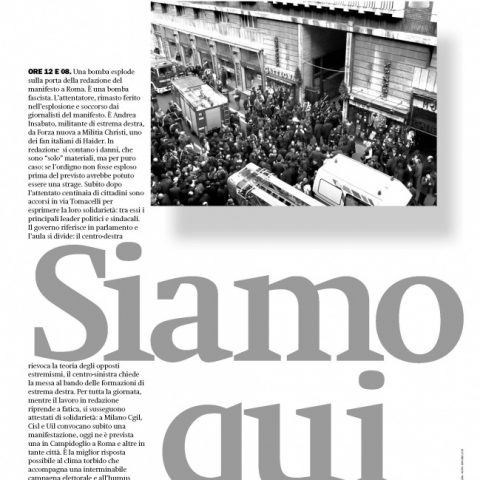About il manifesto global
Three days before Christmas, in 2000, reporters at the Italian daily newspaper il manifesto assembled in the newsroom of their Rome headquarters for the usual editorial staff meeting. At the same time, a strange man approached the front door with a package decorated in holiday gift wrap and set it on the floor. The man was Andrea Insabato, a right-wing hardliner, and the gift was a bomb. But he set it incorrectly, and it erupted before he could dash away. “There was a huge explosion,” said Riccardo Barenghi, editor of the paper at the time. “The front door had been blown in, and on the landing there was an injured man in a pool of blood.” All the journalists, gathered inside for their meeting, were unharmed.Il manifesto is the kind of newspaper that makes stupid people want to blow it up. Il manifesto was founded in 1969 on the idea that truth and freethinking are more important than everything else, including profit. The paper pays for its editorial idealism in the form of lost advertising. But we more than make up for this in the support of tens of thousands of subscribers who believe a better world is possible. There are no owners (il manifesto is a cooperative), and the editor and managers are elected every four years by the employees. We maintain a newsroom in Rome and correspondents around the world, filing dispatches from Paris, London, Berlin, Jerusalem, Havana, New York, Los Angeles and elsewhere. Until 2016, il manifesto published only in Italian. (Pick up a paper from a newsstand next time you're in Rome.) But that changed with the launch of il manifesto global, an English-language digital publication bringing translations of our reportage, news analysis and commentary to an international audience.Global is now part of a conversation about what it means to be a world citizen in a system riven with injustice and inequality. We ask cutting questions and challenge prevailing dogmas. As our former longtime editor, Norma Rangeri, wrote: “The shape of our paper, its character as an independent publication answering to no master, and our cooperative of journalists and technicians, have always been a happy anomaly, a heresy, flesh-and-blood evidence that the market is not an absolute monarch, and that we are not bound by its laws.”
Il manifesto was founded in 1969 on the idea that truth and freethinking are more important than everything else, including profit. The paper pays for its editorial idealism in the form of lost advertising. But we more than make up for this in the support of tens of thousands of subscribers who believe a better world is possible. There are no owners (il manifesto is a cooperative), and the editor and managers are elected every four years by the employees. We maintain a newsroom in Rome and correspondents around the world, filing dispatches from Paris, London, Berlin, Jerusalem, Havana, New York, Los Angeles and elsewhere. Until 2016, il manifesto published only in Italian. (Pick up a paper from a newsstand next time you're in Rome.) But that changed with the launch of il manifesto global, an English-language digital publication bringing translations of our reportage, news analysis and commentary to an international audience.Global is now part of a conversation about what it means to be a world citizen in a system riven with injustice and inequality. We ask cutting questions and challenge prevailing dogmas. As our former longtime editor, Norma Rangeri, wrote: “The shape of our paper, its character as an independent publication answering to no master, and our cooperative of journalists and technicians, have always been a happy anomaly, a heresy, flesh-and-blood evidence that the market is not an absolute monarch, and that we are not bound by its laws.”
